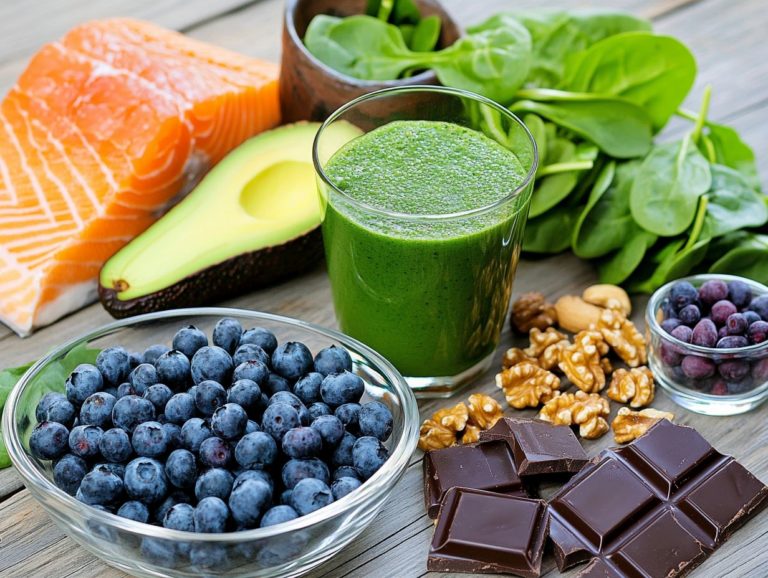What Is the Role of Antioxidants?
Antioxidants play a vital role in maintaining your health. They protect your body from damaging changes caused by unstable molecules.
This article explores what antioxidants are, examining the different types natural and synthetic and highlighting their considerable benefits for your overall well-being.
You will discover foods rich in antioxidants, the importance of supplements, and simple ways to effortlessly incorporate these nutritional powerhouses into your meals.
By the end, you will be ready to boost your health and elevate your diet.
Contents
Key Takeaways:
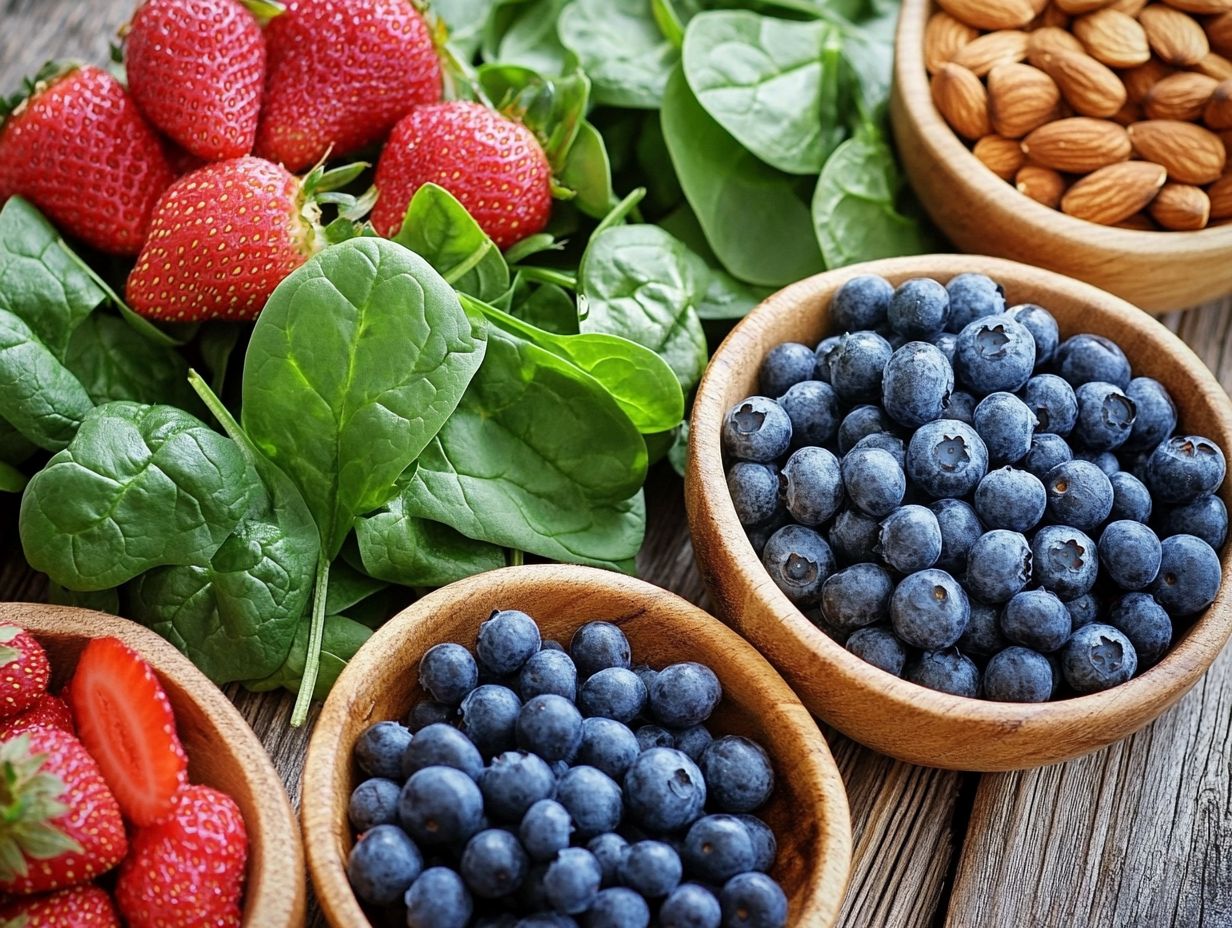
Antioxidants play a crucial role in protecting our bodies from oxidative stress, which can lead to various health issues.
Natural antioxidants found in fruits, vegetables, and other plant-based foods are more effective and safer than synthetic antioxidants found in processed foods.
Incorporating antioxidant-rich foods, such as berries, nuts, and green leafy vegetables, can provide numerous health benefits and support overall well-being.
Understanding Antioxidants
Antioxidants are stable molecules that safeguard your body against the harmful effects of free radicals.
These unstable atoms can trigger harmful changes in your body, leading to health concerns like heart disease, cancer, and age-related issues.
By neutralizing these free radicals, antioxidants help reduce cellular damage, significantly aiding in disease prevention and promoting your overall well-being.
Definition and Function
Antioxidants are remarkable compounds that inhibit oxidation a chemical reaction that generates free radicals, causing oxidative stress and potential cellular damage.
These vital molecules help neutralize free radicals, which can harm your cells and tissues. When free radicals build up in your body, they can lead to chronic diseases, including heart disease and various neurodegenerative conditions.
The balance between antioxidants and free radicals is delicate; too much oxidative stress can overwhelm your body s defenses.
Essential antioxidants, such as vitamins C and E, along with phytochemicals in fruits and vegetables, work together to minimize this risk, reinforcing your cellular integrity and promoting overall well-being.
Types of Antioxidants
Antioxidants can be divided into two main categories: natural and synthetic. Each type plays a crucial role in boosting antioxidant activity in your body.
Natural vs. Synthetic Antioxidants
Natural antioxidants, found in plant-based foods, are distinct from synthetic ones in both origin and health benefits. These compounds thrive in colorful fruits and vegetables, like blueberries, spinach, and carrots, drawing their protective qualities from the rich pigments that give these foods their vibrant colors.
Nuts such as walnuts and almonds, along with seeds like chia and flax, are excellent sources of these natural defenders. In contrast, synthetic antioxidants are typically manufactured in laboratories. While they may seem appealing due to cost-effectiveness and stability, there are concerns about their long-term safety and effectiveness.
By choosing natural sources, you embark on a holistic journey toward health, enriching your body while enjoying nature’s offerings.
Benefits of Antioxidants
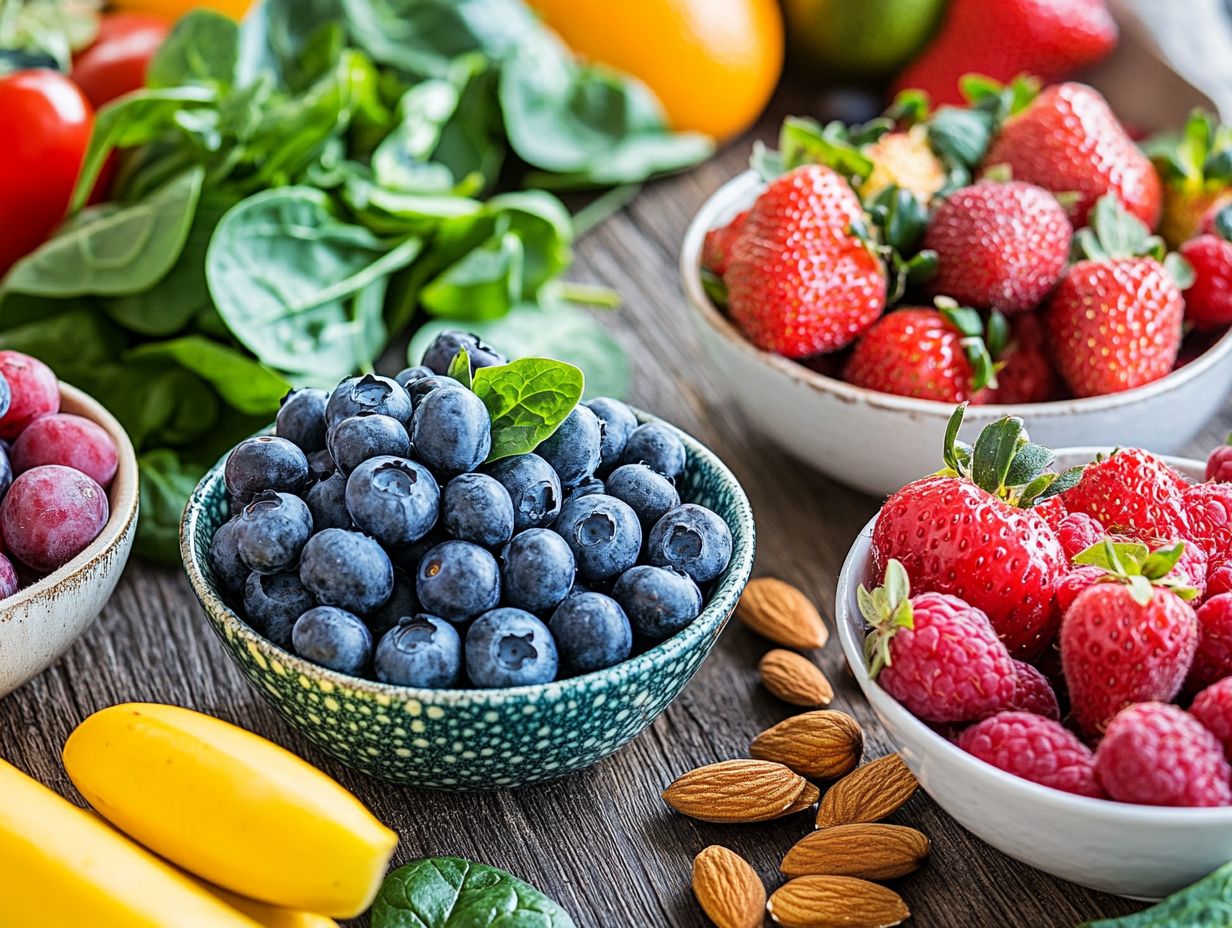
The advantages of antioxidants go far beyond just protecting your cells. They are crucial in fighting oxidative stress, which boosts your immune system and lowers the risk of chronic conditions like heart disease and Alzheimer’s disease.
Key Benefits of Antioxidants:
- Protect cells from damage
- Strengthen the immune system
- Lower the risk of chronic diseases
To reap the benefits, consider incorporating more antioxidant-rich foods into your diet today!
Protecting Against Oxidative Stress
Antioxidants act as your body’s shield against oxidative stress by neutralizing free radicals that can harm your cells and contribute to chronic illnesses.
Antioxidants stabilize free radicals by donating electrons. This protective mechanism is vital for maintaining cellular health, as unchecked oxidative stress can trigger inflammation and compromise essential cellular structures.
When these oxidative processes spiral out of control, they play a significant role in the emergence of serious health conditions like heart disease and cancer. By reducing oxidative stress, antioxidants not only bolster your immune system but may also lower your risk of chronic diseases, ultimately promoting your overall well-being.
Supporting Overall Health
Along with fighting oxidative stress, antioxidant-rich foods bring a wealth of health benefits to the table, enhancing your overall well-being. They strengthen your immune system while promoting healthy aging, making them essential allies on your wellness journey.
These powerful compounds significantly improve nutrient absorption, allowing your body to utilize vitamins and minerals more effectively. They help prevent age-related diseases like heart disease and certain types of cancer by reducing inflammation and neutralizing free radicals.
Antioxidants also support cellular function, translating to higher energy levels and sharper cognitive performance. Ultimately, incorporating antioxidant-rich foods into your diet can cultivate a more resilient body, underscoring the vital role these nutrients play in maintaining health and vitality as you age.
Food Sources of Antioxidants
Incorporating a diverse array of antioxidant-rich foods into your diet is vital for maintaining optimal health and warding off chronic diseases.
Eating colorful fruits and vegetables is essential for your health don t miss out on these vital nutrients!
Top Antioxidant-Rich Foods
Some of the finest antioxidant-rich foods at your disposal include vibrant fruits, nutrient-rich vegetables, nuts, and seeds each brimming with unique plant chemicals and health benefits.
These foods are teeming with a variety of antioxidants that work tirelessly to combat oxidative stress, reduce inflammation, and promote your overall well-being.
Take artichokes, for example; they are remarkably rich in cynarin, which supports liver health and aids digestion. Blueberries are celebrated for their high anthocyanin content, which has been linked to enhanced brain function and heart health.
Let s not forget dark chocolate particularly varieties with high cocoa content offering flavonoids that can help lower blood pressure and boost your mood.
By incorporating these powerhouse items into your balanced diet, you can make significant strides in maintaining a healthy lifestyle.
Supplements and Antioxidants
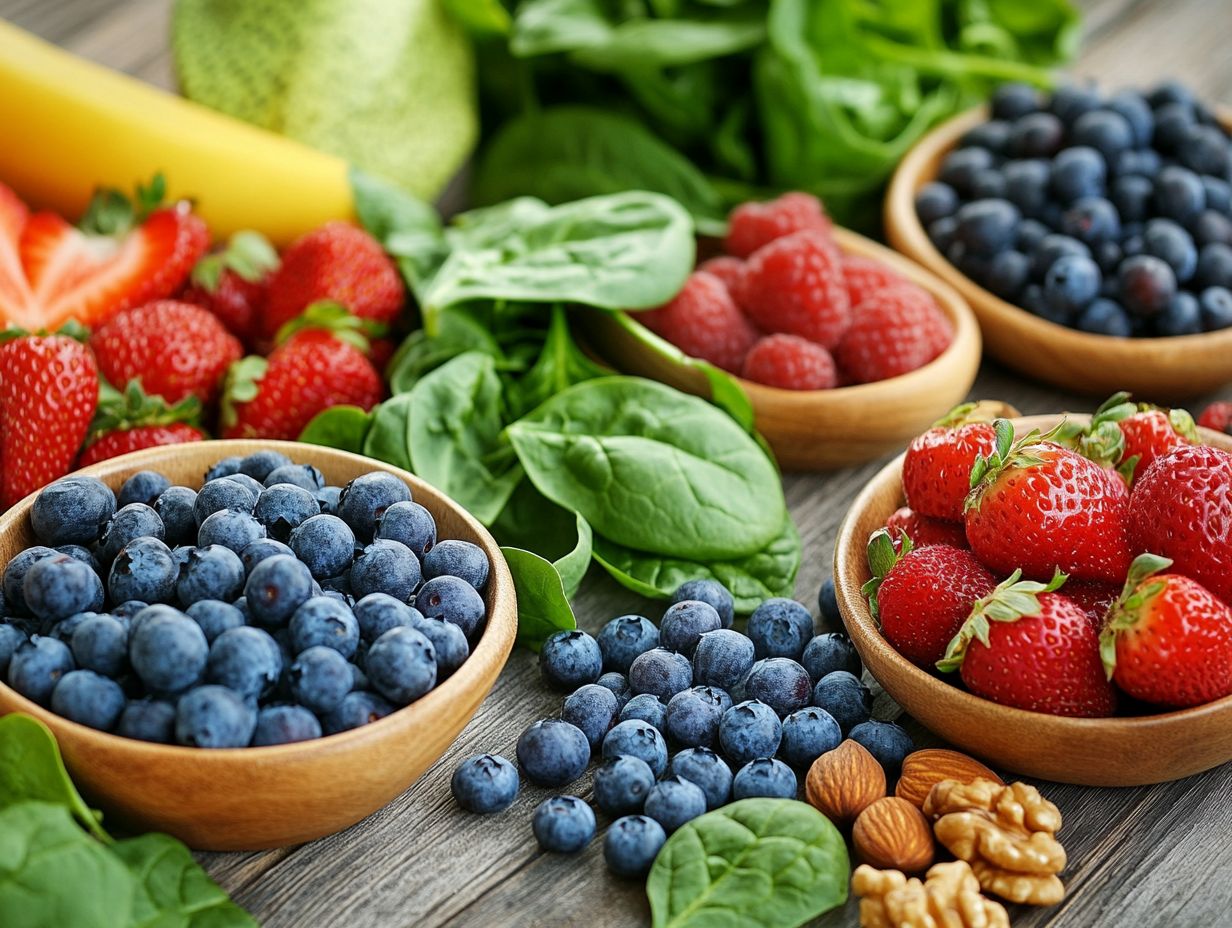
Antioxidant supplements have become quite the trend, offering a convenient boost to your dietary intake.
However, it s essential for you to approach their health claims and long-term effects with a discerning eye.
Do They Work and Are They Safe?
The efficacy and safety of antioxidant supplements is a topic that invites considerable debate, with various studies presenting mixed results regarding their health claims. While some researchers point out that these supplements could theoretically mitigate oxidative stress and inflammation, the tangible benefits in preventing chronic diseases such as heart disease or cancer remain somewhat ambiguous.
You might find that many professionals advocate for obtaining antioxidants through a well-rounded diet rich in fruits, vegetables, and whole grains. This approach aligns with dietary guidelines that prioritize whole foods over isolated nutrients.
Concerns about the potential risks of excessive supplementation have sparked calls for more rigorous clinical trials, which could shed light on how these products genuinely influence overall health and disease prevention.
Incorporating Antioxidants into Your Diet
Incorporating antioxidants into your diet can be a delightful and effortless endeavor.
With a wealth of tips and recipes at your fingertips, you can easily craft meals that are rich in antioxidants, transforming your culinary experience into something both healthful and enjoyable.
Start today and feel the difference in your health and energy levels!
Tips and Recipes for Antioxidant-Rich Meals
Boost antioxidants in your meals by using cooking methods like steaming or saut ing. These methods help retain nutrients.
Incorporating a vibrant array of colorful fruits and vegetables into your dishes is essential. Experiment with ingredients such as kale, berries, and sweet potatoes to transform your meals while delivering numerous health benefits.
Blend a delicious berry smoothie with spinach and chia seeds for a nutrient-packed snack that you’ll love!
By engaging in mindful meal planning that aligns with dietary guidelines, you showcase a well-rounded approach to nutrition. Incorporating these antioxidant-rich foods into your diet is not only beneficial but also enjoyable.
Frequently Asked Questions
What Is the Role of Antioxidants?
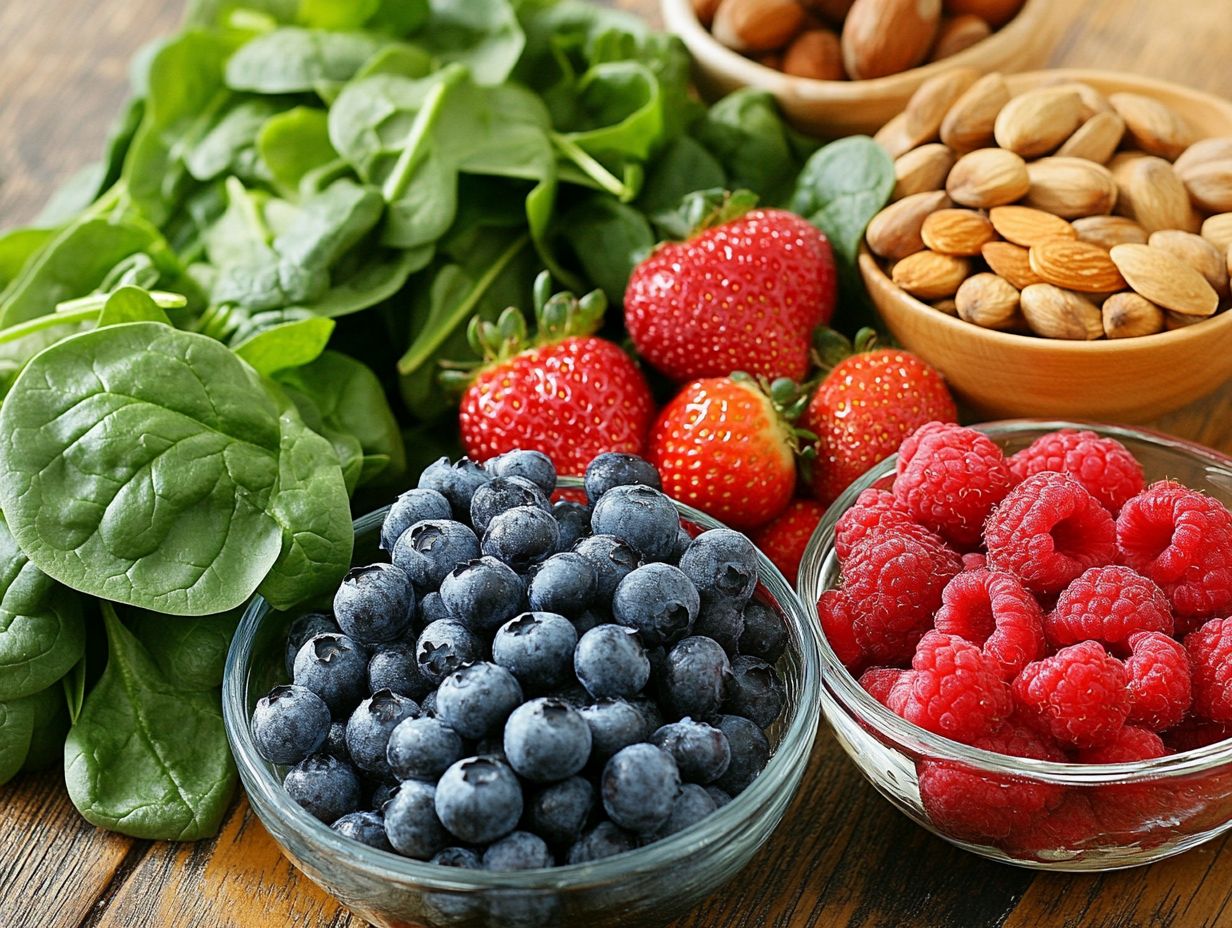
Antioxidants are substances that help protect our cells from damage caused by free radicals. Free radicals are unstable molecules that can harm our body’s DNA, proteins, and other important cellular components.
How do antioxidants protect our cells?
Antioxidants neutralize free radicals by donating an electron to them, stabilizing them and preventing damage to our cells. This process is also known as oxidation.
What are some common types of antioxidants?
Some common types of antioxidants include vitamins C and E, beta-carotene, and selenium. You can find these in a variety of foods such as fruits, vegetables, nuts, and grains.
What are the health benefits of consuming antioxidants?
Consuming antioxidants may help reduce the risk of chronic diseases such as cancer, heart disease, and Alzheimer’s disease. They also have anti-inflammatory properties and may improve overall immune function.
Can antioxidants be obtained through supplements?
Yes, antioxidants can also be obtained through supplements. However, it is generally recommended to get them through a varied and balanced diet. Always consult a healthcare professional before taking any supplements to ensure you’re making the best choice for your health.
What happens if we have too many or too few antioxidants in our body?
If we have too many antioxidants, it can lead to an imbalance in our body and potentially interfere with normal cell functioning. Conversely, having too few antioxidants can increase the risk of cellular damage and disease. It’s important to maintain a healthy balance of antioxidants in our body.
What delicious, antioxidant-rich meals will you try today? Dive into the world of antioxidants and discover the tasty benefits today!

